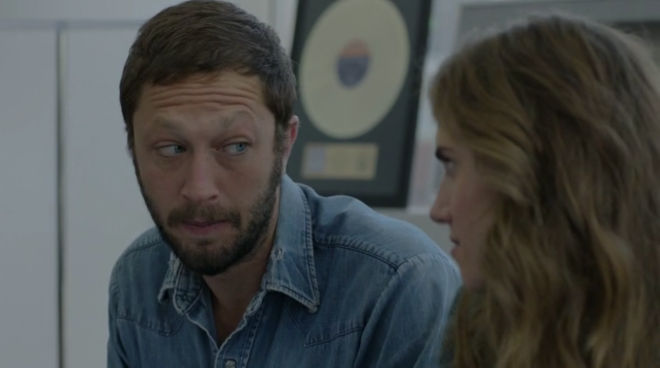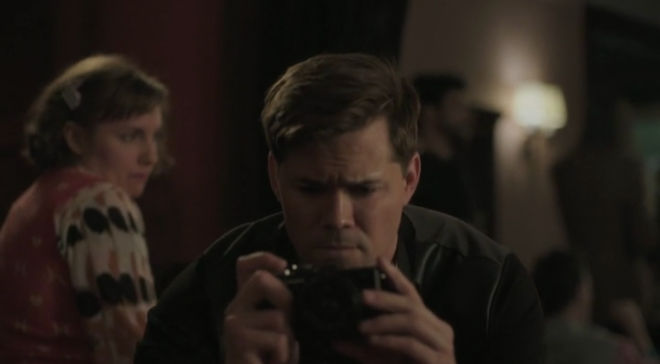‘Girls’ Recap: When Does “Write What You Know” Become Lazy And Arrogant?
Three episodes in, and 'Girls' gets "hysterical".
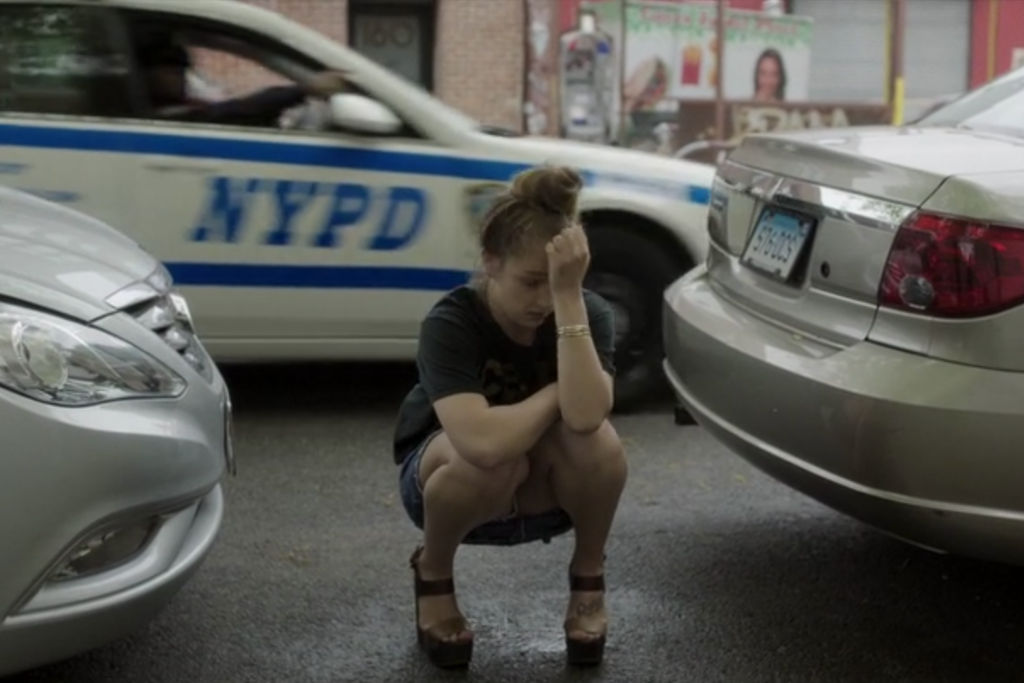
This is a recap of the most recent episode of Girls, ‘Female Authors’. Spoilers lie ahead.
–
Dispersing the characters of Girls to various places and pursuits has given the show a similarly scattered feel. It’s always hopped between storylines with varying degrees of nimbleness, but it’s a half-hour “prestige” comedy with the cast of a tightly-paced 22-minute sitcom, and virtually none of the structure that format demands. The first episode gets a pass because it needs to do some table-setting and reintroduction, but these last two chapters have ended a bit abruptly, with the feeling that not that much has actually happened.
This disjointed, unsatisfying vibe might be deliberate – it’s not dissimilar to the feeling of literal and emotional distance that can grow in groups of friends transitioning out of their early 20s, when there tends to be more structure. And the further away you get from those people the easier it becomes to see yourself as others see you, and to try to reinvent yourself and present a new self to the world.
The thing is, once you’ve actually done that thing you were always going to do, shaken off the old baggage and bad habits and started (if not finished) becoming who you are, you don’t always change as much as you think you will. What if you “fix” that big problem, or finally do what you’ve been dreaming of doing, and you’re still the exact same person? What if you change that big thing and you’re not the same person at all? Who are you if you’re totally different when you’re sober, or alone, or “normal”, or not a dancer, or not a writer?
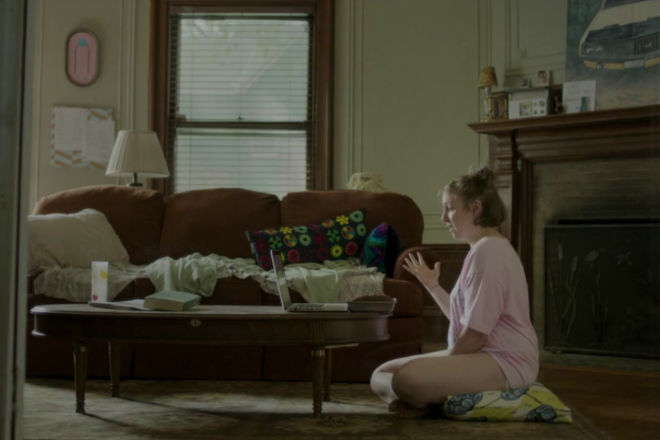
“I’m more of a pre-writer at the moment.”
The good news is that the show already has a role model for positive change: Ray got his life in order after hitting rock bottom last season and seems to have kept it up. Marnie keeps feinting towards positive steps herself, although her motivations for pursuing her music career are tied up, maybe inextricably, with her infatuation with Desi.
The way Desi brushed off Marnie’s mid-rimjob “I love you” last week was telling – he’s well aware he’s the real arsehole here, but he’s justifying it to himself with post-monogamist blather, at once blaming Clementine’s supposed fragility for his ongoing deception, and pretending she doesn’t come into the equation at all Because Of The Art (and the sex, which seems to be part of The Art here in the same way my accountant can write off my book accumulation as professional research).
But Marnie avoids calling him out on moral grounds, because she’s obviously complicit; instead, she makes a startlingly mature plea for him to stop putting the whole issue onto her when she’s made herself quite clear.
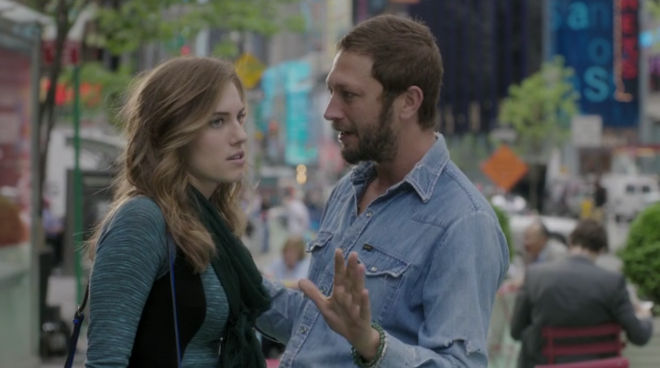
“So THIS is what is feels like to make this face at someone who isn’t me!”
The camera lingers on Marnie’s face without revealing Desi’s reaction, because it’s more important to show Allison Williams almost glowing with sureness and a glimmering of something like self-esteem. The fact that she’ll apparently still sex-tackle any fellow who says something genuinely nice about her remains worrying, but hold up the positively beatific, all-new Ray Ploshansky next to Desi’s self-serving pretension, and Marnie starts to look positively sensible.
Meanwhile in Iowa, Hannah’s isolation is heightened by Elijah’s carefree dedication to all his new friends (Tran! Dee Dee! Ravi!), and his apparent ease in finding them and sliding into intimacy. It’s hard to tell whether Elijah is supposed to be a good influence or not – he’s probably helping to keep Hannah sane day-to-day purely by being there, but he certainly shares her gift for bluntness. His comment about how much of a relief it is to give up on your Dream is maybe not that helpful, but it seems to at least partially fuel the excellent scene that follows with Hannah’s classmates.
Hannah makes some fair points about how her classmates have framed her work, and how it’s part of a larger pattern of women’s writing being belittled. Their blunt comments have been burning in her since the last workshop, and whether she genuinely believes that she’s got something to say as a writer or not (because she’s certainly questioning that), she’s clearly riled by the implication that her story in and of itself is not worth telling. She then goes on to conflate the writers and their work, as she feels they’ve done to her; whether she’s at all justified in this, at least in the parts where she’s talking about the work rather than the person, it’s difficult to tell.
We don’t hear about what Logan (the blonde with the permanent cat’s bum expression) and Chandra (Hannah’s arch non-friend) actually write about, but Jeffrey’s Updike-worshipping, white-middle-class rebellion, Chester The Tragically Hip Gaysian’s “manic pixie dream girl pseudo-Weetzie-Bat bullshit”, and DeAugust’s mundane, gritty tragedy do sound like extensions of their desired personal aesthetic, projected into the work they do as a way of trying to decorating their own pigeonholes. (The round-faced white girl named Priya who is apparently fixated on “prison in the South” is slightly more opaque – is that a new stereotype?)
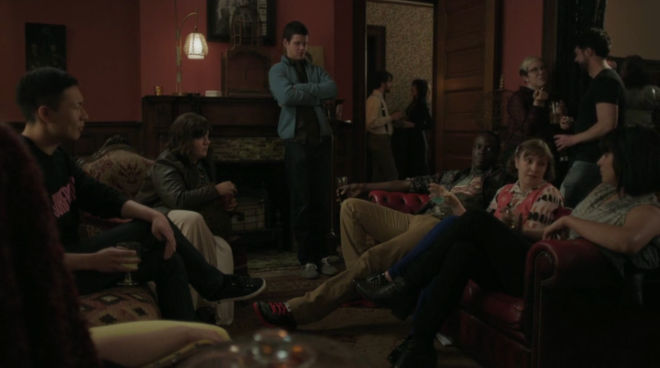
“…and THAT’s why The Lego Movie deserved the Best Picture snub.”
There’s a particular tension in literary fiction between “write what you know”, and romanticising your own identity politics in order to call it Art. Hannah’s on thin ice when she says Chandra’s “blessed with an exotic name” (Why oh why must I have been born a white girl with a simple name? I have missed out on this singular benefit, and there are definitely no downsides to being called something white people think of as “exotic”!), it’s not her place to call out a black guy for wanting to tell stories about black people, and it’s certainly not her place to call out fiction writers for making shit up in a fiction workshop.
But she’s on point about the way female writers are pigeonholed: women’s writing about the everyday and inner lives of women is, the conventional wisdom goes, self-indulgent and interesting to women only, whereas men’s mundane struggles are universally fascinating.
The rest of the group are transfixed by her rant – partly because it hits home in a way that does suggest genuine insight, partly because they’re a circle-jerk of constantly-mediated “creative” personalities, surprised that someone so unfiltered has found her way into their midst, and partly because everyone secretly wants to know what other people actually think of them. The creative workshop, where the writers have to sit silently and accept the feedback of others, is one of those artificial situations where people are supposed give you their unvarnished opinions; it’s like eavesdropping, but with nowhere to hide.
It’s satisfying enough watching Hannah show the others that she might have something interesting to add to the conversation while simultaneously and systematically alienating all of them, but she does it holding a horrifying blue drink and wearing a sweater vest covered in her initial(s), imploring the group to be “honest togetherrrr…” before Fünke-ing out of there.
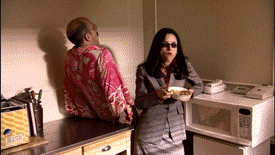
It’s the show’s funniest rant since Shosh’s flirtini-fuelled truth-bomb blitzkrieg, and certainly one of Hannah’s less awkward exits.
Scenes of Elijah and Hannah tearing up Iowa’s academic social scene (not to mention ones of Hannah catching a lift home with a Mennonite man in his buggy, because her second bike was stolen) are fun and all, but at some point we’re going to need a ‘Welcome to Bushwick‘ or a ‘Beach House‘ – one of those episodes that brings the characters together and gives their vague quests and abrasive cluelessness a kind of unity. At the moment all we have are those tenuous threads; a sense of discomfort in one’s own skin and a few half-hearted Skype dates are not enough to hold friendships or TV shows together.
–
–
Girls airs on Showcase at 7.30pm Mondays, with a re-run at 9.35pm each Thursday.
–
Caitlin Welsh is a freelance writer who tweets from @caitlin_welsh. Read her Girls recaps here.
